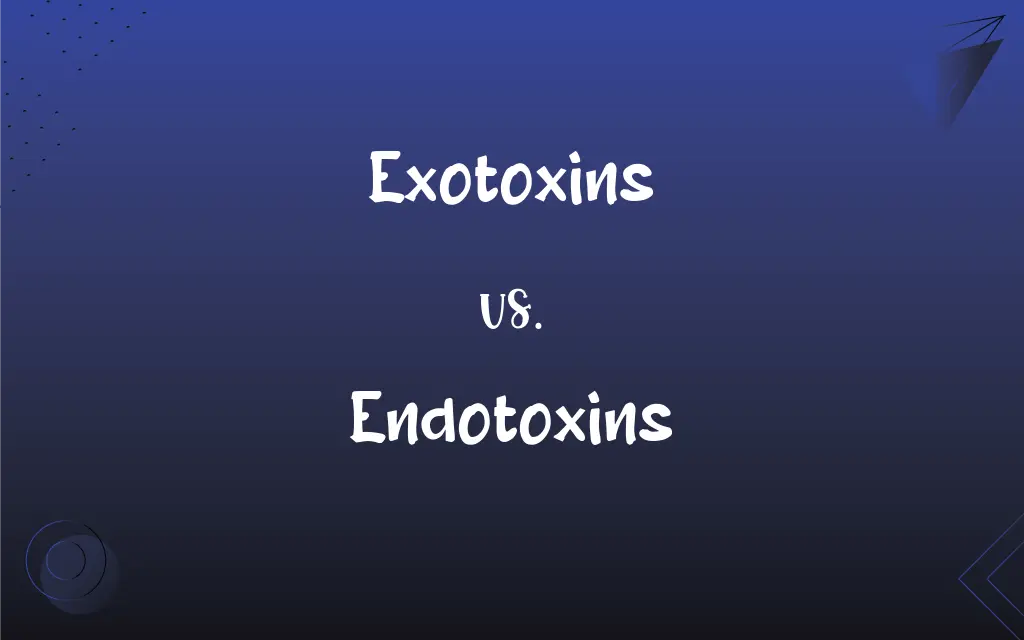Exotoxins vs. Endotoxins: What's the Difference?
Edited by Aimie Carlson || By Harlon Moss || Updated on October 29, 2023
Exotoxins are toxic substances secreted by bacteria into their environment, while endotoxins are part of the bacterial cell wall released when the bacterium dies.

Key Differences
Exotoxins are proteins secreted by certain bacteria that can cause damage to the host by destroying cells or disrupting normal cellular metabolism. They are usually heat labile and can be denatured by heat. Examples of diseases caused by exotoxins include tetanus and botulism. On the other hand, endotoxins are lipopolysaccharides found in the cell wall of Gram-negative bacteria. They are released when the bacteria die and the cell wall breaks apart. Endotoxins are heat-stable and are not easily destroyed by heat.
Exotoxins are produced by both Gram-positive and Gram-negative bacteria, while endotoxins are only produced by Gram-negative bacteria. Exotoxins have specific methods of action, affecting specific cellular structures or functions, which can vary from one type of exotoxin to another. Endotoxins, however, generally produce similar symptoms in the host, such as fever and inflammation.
Exotoxins are highly toxic and can cause severe disease at low concentrations, whereas endotoxins are less toxic and generally require higher concentrations to cause disease. Exotoxins can act locally or systemically and may spread from the site of infection to cause damage to distant parts of the host’s body. In contrast, endotoxins typically cause symptoms at the site of infection.
Exotoxins can be neutralized by antitoxins, while endotoxins cannot be neutralized by antitoxins. Vaccines can be developed against exotoxins, but not against endotoxins. This is because the structure of endotoxins is highly conserved among different species of Gram-negative bacteria, making it difficult to develop vaccines that are specific to a particular species.
Comparison Chart
Proteins
Lipopolysaccharides
Chemical nature
ADVERTISEMENT
Secreted by bacteria
Part of bacterial cell wall
Location in bacteria
Produced by Gram-positive and Gram-negative bacteria
Produced by Gram-negative bacteria
Bacterial source
Highly toxic
Less toxic
Toxicity
Can be neutralized by antitoxins
Cannot be neutralized by antitoxins
Neutralization by antitoxins
Exotoxins and Endotoxins Definitions
Exotoxins
Exotoxins can be neutralized by antitoxins.
The harmful effects of the exotoxins were neutralized by the antitoxins produced by the host’s immune system.
ADVERTISEMENT
Endotoxins
Endotoxins are heat-stable and not easily destroyed by heat.
Unlike exotoxins, endotoxins remain toxic even after being exposed to heat.
Exotoxins
Exotoxins can act locally or systemically.
The exotoxins spread from the site of infection, causing damage to distant parts of the body.
Endotoxins
Endotoxins generally produce similar symptoms in the host.
The symptoms produced by endotoxins, such as fever and inflammation, are similar across different species of bacteria.
Exotoxins
Exotoxins are proteins secreted by bacteria.
The exotoxins produced by the bacteria caused damage to the host’s cells.
Endotoxins
Endotoxins are lipopolysaccharides found in the cell wall of Gram-negative bacteria.
The endotoxins released from the bacteria caused fever and inflammation in the host.
Exotoxins
Exotoxins can cause severe disease at low concentrations.
Even a small amount of exotoxins can result in significant harm to the host.
Endotoxins
Endotoxins typically cause symptoms at the site of infection.
The endotoxins produced symptoms of infection at the location where the bacteria were present.
Exotoxins
Exotoxins can vary in their methods of action.
Different exotoxins affect different cellular structures or functions.
Endotoxins
Endotoxins cannot be neutralized by antitoxins.
The harmful effects of the endotoxins could not be neutralized by antitoxins.
Endotoxins
A toxin produced by certain bacteria and released upon destruction of the bacterial cell.
Endotoxins
Plural of endotoxin
FAQs
What diseases are caused by exotoxins?
Tetanus and botulism are examples of diseases caused by exotoxins.
What symptoms are caused by endotoxins?
Fever and inflammation are common symptoms caused by endotoxins.
How are exotoxins different from endotoxins?
Exotoxins are proteins, while endotoxins are lipopolysaccharides. Exotoxins are secreted, while endotoxins are part of the cell wall.
Can endotoxins be neutralized by antitoxins?
No, endotoxins cannot be neutralized by antitoxins.
Are exotoxins produced by Gram-positive bacteria?
Yes, exotoxins are produced by both Gram-positive and Gram-negative bacteria.
Are vaccines available against endotoxins?
No, vaccines are not available against endotoxins.
What is the heat stability of endotoxins?
Endotoxins are heat-stable and are not easily destroyed by heat.
How do endotoxins spread in the host’s body?
Endotoxins typically cause symptoms at the site of infection.
What are endotoxins?
Endotoxins are lipopolysaccharides found in the cell wall of Gram-negative bacteria.
Can exotoxins be neutralized by antitoxins?
Yes, exotoxins can be neutralized by antitoxins.
Are vaccines available against exotoxins?
Yes, vaccines can be developed against exotoxins.
What is the toxicity of exotoxins compared to endotoxins?
Exotoxins are highly toxic and can cause severe disease at low concentrations, while endotoxins are less toxic.
Can exotoxins be destroyed by heat?
Yes, exotoxins are usually heat labile and can be denatured by heat.
Can endotoxins be destroyed by heat?
No, endotoxins are heat-stable and are not easily destroyed by heat.
What are exotoxins?
Exotoxins are toxic proteins secreted by bacteria.
Are endotoxins produced by Gram-positive bacteria?
No, endotoxins are only produced by Gram-negative bacteria.
What is the heat stability of exotoxins?
Exotoxins are usually heat labile and can be denatured by heat.
How do exotoxins cause damage to the host?
Exotoxins can destroy cells or disrupt normal cellular metabolism.
How do endotoxins cause damage to the host?
Endotoxins generally cause fever and inflammation in the host.
How do exotoxins spread in the host’s body?
Exotoxins can act locally or systemically and may spread from the site of infection.
About Author
Written by
Harlon MossHarlon is a seasoned quality moderator and accomplished content writer for Difference Wiki. An alumnus of the prestigious University of California, he earned his degree in Computer Science. Leveraging his academic background, Harlon brings a meticulous and informed perspective to his work, ensuring content accuracy and excellence.
Edited by
Aimie CarlsonAimie Carlson, holding a master's degree in English literature, is a fervent English language enthusiast. She lends her writing talents to Difference Wiki, a prominent website that specializes in comparisons, offering readers insightful analyses that both captivate and inform.































































